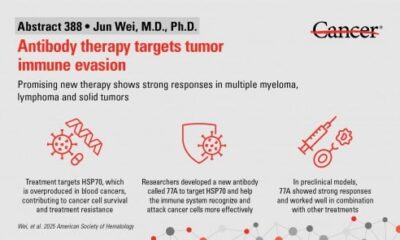Health
Research Uncovers Alzheimer’s Protein Boosts Immune Defense Against Cancer

A groundbreaking study reveals that a protein associated with Alzheimer’s disease may play a significant role in enhancing the immune system’s ability to combat cancer. Researchers at the Hollings Cancer Center at the Medical University of South Carolina (MUSC) found that a byproduct of amyloid-beta rejuvenates T cells, which are crucial for fighting tumors, thereby dramatically lowering cancer risk among individuals with Alzheimer’s.
The connection between Alzheimer’s and cancer has puzzled scientists for years. Notably, studies indicate that people diagnosed with Alzheimer’s disease are 21 times less likely to develop cancer compared to those without the condition. This paradox has prompted further investigation into the underlying mechanisms.
Investigating the Protective Mechanism
The study focused on the amyloid-beta precursor protein (APP), which is closely linked to Alzheimer’s. Researchers examined how APP and its breakdown product, amyloid-β 40, interact within T cells that target tumors. As T cells age, they often experience an overactive process known as mitophagy, which leads to increased mitochondrial degradation and weakened immune responses, ultimately impairing their cancer-fighting abilities.
To delve into these processes, scientists conducted a series of experiments on both human and animal models. Using genetically modified mice that exhibit Alzheimer’s-like characteristics, they compared tumor growth rates between these mice and those without Alzheimer’s. The team transferred T cells from Alzheimer’s mice to non-Alzheimer’s mice with cancer to assess whether these immune cells could influence tumor progression.
Their findings revealed that T cells from Alzheimer’s mice had healthier mitochondria and exhibited a significantly reduced rate of tumor growth. This suggested that the protective effects were immune-driven rather than solely a result of Alzheimer’s disease itself.
Mechanisms Behind the Findings
The research indicated that in Alzheimer’s mice, APP and amyloid-β 40 entered mitochondria, preventing excessive mitophagy. This preservation of mitochondrial health led to enhanced T cell functionality. Cancers developed much more slowly in these mice, reinforcing the idea that APP has a rejuvenating effect on the immune system.
A critical aspect of the study involved examining fumarate, a metabolite essential for energy production within mitochondria. The researchers discovered that aging T cells typically lose fumarate, triggering accelerated mitochondrial damage through increased mitophagy. APP prevented this loss, thereby safeguarding mitochondria and improving T cell performance.
Additionally, APP interfered with the movement of a protein known as CerS6, which produces ceramide—a lipid that activates mitophagy. By blocking this cycle, APP helped maintain T cell health.
Dr. Besim Ogretmen, associate director of Basic Science at the Hollings Cancer Center and the study’s corresponding author, emphasized the significance of these findings. “When you deplete fumarate, you increase mitophagy much more,” he explained. “It’s like a reinforcing feedback loop.”
The study also demonstrated that supplementing aging T cells with extra fumarate or healthy mitochondria could replicate the cancer-fighting effects observed in Alzheimer’s cells, suggesting potential therapeutic avenues.
The implications extend beyond animal studies. T cells from older human subjects displayed similar patterns of excessive mitophagy and reduced fumarate levels. However, T cells from older individuals with Alzheimer’s showed corrections in these issues, mimicking the results seen in the mouse models.
Ogretmen noted, “Older T cells began functioning like young, active T cells again. That was an incredible finding because it suggests a whole new way to think about rejuvenating the immune system.”
Taken collectively, these findings provide a compelling explanation for why individuals with Alzheimer’s have a lower incidence of cancer. The research opens new doors for therapeutic strategies aimed at mitigating aging-related immune decline. Targeting mitophagy, restoring fumarate levels, or modulating APP-related pathways may enhance cancer immunotherapy for older adults.
The study was published in the journal Cancer Research, underscoring the potential for innovative approaches in the fight against cancer.
-

 Science1 month ago
Science1 month agoNostradamus’ 2026 Predictions: Star Death and Dark Events Loom
-

 Technology2 months ago
Technology2 months agoOpenAI to Implement Age Verification for ChatGPT by December 2025
-

 Technology7 months ago
Technology7 months agoDiscover the Top 10 Calorie Counting Apps of 2025
-

 Health5 months ago
Health5 months agoBella Hadid Shares Health Update After Treatment for Lyme Disease
-

 Health5 months ago
Health5 months agoAnalysts Project Stronger Growth for Apple’s iPhone 17 Lineup
-

 Technology5 months ago
Technology5 months agoElectric Moto Influencer Surronster Arrested in Tijuana
-

 Education5 months ago
Education5 months agoHarvard Secures Court Victory Over Federal Funding Cuts
-

 Health5 months ago
Health5 months agoErin Bates Shares Recovery Update Following Sepsis Complications
-

 Technology7 months ago
Technology7 months agoMeta Initiates $60B AI Data Center Expansion, Starting in Ohio
-

 Technology6 months ago
Technology6 months agoDiscover How to Reverse Image Search Using ChatGPT Effortlessly
-

 Science4 months ago
Science4 months agoStarship V3 Set for 2026 Launch After Successful Final Test of Version 2
-

 Technology7 months ago
Technology7 months agoRecovering a Suspended TikTok Account: A Step-by-Step Guide





















